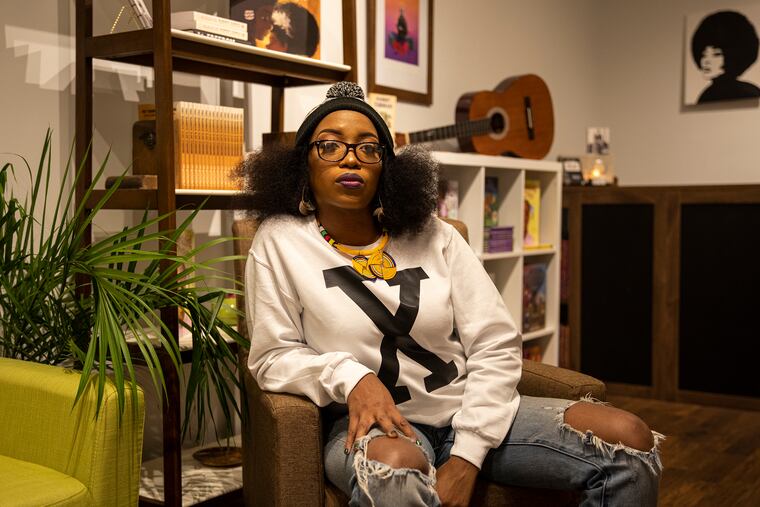Harriett’s Bookshop in Fishtown: 'A space of peace for people in a chaotic world’
Owner Jeannine A. Cook specializes in books by black and women authors. Her store is also a community space "for folks to come together, discuss ideas, and debate in a healthy way," she said.

The North Philadelphia house where Jeannine A. Cook and her toddler son, Messiah, used to live was just a shell. It had no running water. There were unfinished walls, rickety steps, no kitchen. She made it work.
She would walk to her neighborhood bodega to purchase gallons of water for baths. She used socks in her kerosene lamp during the winter. As a student at the University of the Arts, in 2005, she would bring her son to class.
This month, Cook, now 36, realized a dream that comforted her during those difficult years. She opened Harriett’s Bookshop in Fishtown and is specializing in women authors.
More than a place to buy books, Cook said, Harriett’s is “a community space for folks to come together, discuss ideas, and debate in a healthy way.”
Cook designed the store to mirror her own ideal reading conditions.
One large bookshelf houses titles by Zadie Smith, Toni Morrison, Ntozake Shange, Zora Neale Hurston, Lorene Carey, and Erica A. Dunbar. Next to it, a stream of incense smoke eases into the air. Near an adjacent wall, a majesty palm sits beside a green sofa.
Smaller shelves and fixtures throughout the shop showcase more books. A painted portrait of activist Angela Davis is illuminated by a citrus-scented candle.
It’s quiet here. Occasionally, recordings of Nina Simone’s voice fill the space, but on most days, only the sounds of Girard Avenue break the silence.
“The book display feels a little bit more like a gallery," Cook said. "The smell feels a little bit more like a sanctuary. I’m doing what I can to create a space of peace for people in a chaotic world.”
When Cook was 11 and living in Virginia, her mother went blind. She would listen as Cook and her sisters read out loud, helping her work toward her master’s degree in theology from Richmond Virginia Seminary. Through this practice, Cook learned to love books — devoutly.
“She would have us reading these deep, theological books,” Cook reminisced. “She would have us take turns, either reading or typing up her thoughts.” Witnessing their mom accomplish such a feat, “we knew she could do anything.” And Cook tapped into her mother’s determination during her own turbulent times.
Before opening the shop, Cook developed curricula on racism and other oppressive structures for many organizations, most recently for the American Friends Service Committee.
Naomi Wetmore, who lives around the corner from the shop, came to Harriett’s opening celebration and walked out with Amanda Li’s Rise Up: Ordinary Kids with Extraordinary Stories in one hand, and her son’s grip in the other. She said she bought the book to teach him about activism.
Tynetta Brown drove to Harriett’s from Wilmington to purchase Hurston’s Hitting a Straight Lick with a Crooked Stick. She said she felt compelled to support Harriett’s because “[Cook] is brave enough to delve into owning an actual brick-and-mortar bookstore.”
Opening a bookstore in the age of Amazon isn’t quite as risky as it sounds, said Wayne W. Williams, an associate professor at Temple University’s Fox School of Business. And Cook isn’t alone in trying: The number of privately-owned bookstores in the country is up 31% since 2009, according to a recent report from the American Booksellers Association.
“The challenge with bookstore operations is the ongoing overhead expenses of having a brick and mortar," he said.
In order to stay viable, Harriett’s will likely have to create plans to diversify its sales, Williams said. Being able to pivot as consumer demands change is also key in sustaining a bookstore.
By Cook’s account, customers spend $20 to $30 per book; anything in the used books collection is a flat $5. She has already sold out her inventory twice since opening.
The shop will also host monthly events like Whiskey Writer’s Night, where a group of writers will meet and work over a glass of whiskey. On other nights, musicians like percussionists or a cellist might perform.
Having a limited inventory is part of Cook’s business strategy. It creates a sense of urgency, she said. “Part of the appeal is that the store is not overflowing with books," explained Cook. "If you want this book, you better hurry up and come get it before someone else buys it.”
Philly poet laureate Trapeta B. Mayson came to read at Harriett’s opening and said she’s eager to partner with the store because of Cook’s commitment to her community.
“People need these sacred spaces, particularly when they are facilitated by someone who will care, not only about the literature, or the business, but also the community,” Mayson said. “[Cook] is bringing together people from all walks of life.”
When Cook asked her to participate, she jumped at the chance. Mayson recited four poems to the dozens of patrons who packed the space. “How could I not?" Mayson said. “We learn to face the wounds of our past, we learn to love ourselves. So I wanted to dedicate that to Jeannine and her bookstore.”
Video by staff videographer Raishad M. Hardnett.